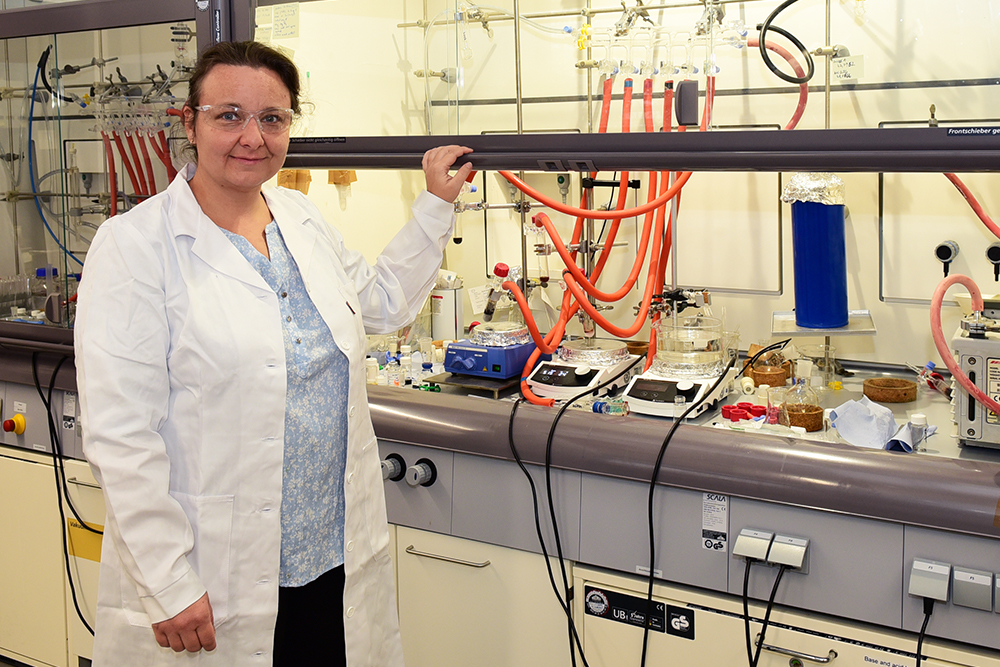Nachhaltige Methoden, nachwachsende Rohstoffe und umweltfreundliche Reaktionen stehen in der sogenannten „Grünen Chemie“ im Fokus. ChemikerInnen der Universität Graz arbeiten erfolgreich auf diesem Gebiet. Mit der neuen Professorin Katalin Barta Weissert, zuletzt an der Universität Groningen (NL) tätig, haben dieser Sektor und zugleich der Profilbildende Bereich „Climate Change Graz“ Verstärkung erfahren. „Ich hatte bereits zuvor Kontakt mit ChemikerInnen der Universität Graz und wusste, es ist ein sehr gutes Institut“, begründet Barta Weissert ihren Entschluss, Anfang des Jahres von den Niederlanden nach Österreich zu wechseln.
Erneuerbare Ressourcen
Die Wissenschafterin hat neben vielen Auszeichnungen einen ERC Grant in der Höhe von 1,5 Millionen Euro mit im Gepäck. Ein besonderer Fokus ihrer Forschung liegt auf der Katalyse von Biomasse. Und passend zum riesigen Waldbestand der Steiermark widmet sich die Wissenschafterin der Ressource Holz. „Wir entwickeln ganz neue, kreative Methoden, um Stoffe wie etwa Zellulose und Lignin in seine kleinsten Bestandteile zu zerlegen und dann wieder aufzubauen“, erklärt Katalin Barta Weissert. „Dabei achten wir darauf, dass zum Beispiel weniger Nebenprodukte entstehen und die Reaktionsprozesse effizienter ablaufen.“ Dank der Arbeit mit erneuerbaren Ressourcen werde zugleich der Einsatz fossiler Substanzen reduziert, was sich wiederum auf die Klimabilanz positiv auswirkt.
Katalin Barta Weissert und ihrem Team ist es unter anderem bereits gelungen, auf Basis von Holz neuartige Möglichkeiten für die Entwicklung von Arzneimitteln, Polymeren und Biotreibstoffen zu eröffnen. Diese Erkenntnisse sind daher sowohl für die Entwicklung von Patenten als auch für IndustriepartnerInnen interessant. Dieses Ziel verfolgt die Forscherin ebenso in ihrem ERC Starting Grant „CatASus“, in dem sie die Rolle von Aminen, also Stickstoffverbindungen, bei der Katalyse von Biomasse untersucht und der noch bis zum nächsten Jahr läuft.
Damit die Chemie stimmt
Auch in der Zusammenarbeit muss für Barta Weissert die sprichwörtliche Chemie passen. Speziell wenn sich das Team der gebürtigen Slowakin, die in Aachen promovierte und danach vier Jahre an der University of California sowie an der Yale University arbeitete, international zusammensetzt. Ihrer Gruppe gehören DissertantInnen und PostDocs im Moment aus Österreich, Italien, Ungarn, China, Mexiko, Russland, Indien, Brasilien, Belgien und Rumänien an. „Verschiedene Kulturen sind sehr bereichernd“, so die Forscherin. „Respekt und Begegnung auf Augenhöhe sind essenziell.“
